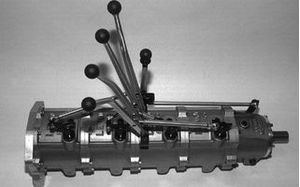Are you considering entering the transmission repair industry and exploring franchise opportunities? In this article, we will delve into the top transmission shop franchises available, providing you with key financial figures and insights into their operations. These established brands offer a solid foundation for success in the automotive repair industry, backed by a proven track record and a commitment to customer satisfaction.
Oil Can Henry's:

- Founded in 1972 and franchising since 1988.
- Over 90 locations across the U.S.
- Initial investment ranges from $235,886 to $297,925.
- Franchise fee of $25,000.
- Royalty fees of 5.5% and an ad royalty fee of 1%.
- Offers affordable, convenient car care services.
- Strong brand recognition and proven software learning systems.
- Actively encourages franchisees to engage with local charities and events.
Milex Complete Auto Care/Mr. Transmission:

- Founded in 1956 and franchising since 1976.
- 88 franchise units in operation.
- Initial investment ranges from $197,457 to $296,767.
- Franchise fee ranging from $35,000 to $45,000.
- Royalty fees of 7% and an ad royalty fee of 1%.
- Provides comprehensive automotive service repairs and maintenance.
- Offers over 50 years of industry experience.
- Offers insider knowledge, cutting-edge repair techniques, and management practices.
Tuffy Tire and Auto Service:

- Established in 1970 and franchising since 1971.
- 165 franchise units in operation.
- Initial investment ranges from $224,000 to $418,500.
- Franchise fee of $30,000.
- Royalty fees ranging from 2.5% to 5% and an ad royalty fee of 5%.
- Evolved from a muffler shop to a full-service repair facility.
- Competitive pricing through strong supplier relationships.
- Provides a complete line of automotive services.
Christian Brothers Automotive:

- Founded in 1982 and franchising since 1996.
- 242 franchise units in operation.
- Initial investment ranges from $454,250 to $582,400.
- Franchise fee of $135,000.
- Royalty fees vary, and an ad royalty fee of $10,000 per year.
- Exclusive geographical territory for each franchisee.
- Extensive training program with over 275 hours of intensive training.
- Offers an established brand and a proven business model.
Meineke Car Care Centers:

- Founded in 1972 and franchising since 1972.
- Over 800 franchise units in operation.
- Initial investment ranges from $162,274 to $528,688.
- Franchise fee of $40,000.
- Royalty fees of $20.8K+ per year and an ad royalty fee of 6%.
- International network of franchised auto care centers.
- Focuses on prompt repairs and preventative maintenance.
- Strong brand recognition and technology-focused services.
Eagle Transmission Services:

- Founded in 1983 and franchising since 1990.
- 26 franchise units in operation.
- Initial investment ranges from $229,000 to $492,500.
- Franchise fee of $31,500.
- Royalty fees of 6% and an ad royalty fee of 2%.
- Specializes in repair, rebuilding, and service for all types of transmissions.
- Provides comprehensive support, training, and quality management.
AAMCO Transmissions and Total Car Care/Mr:

- Founded in 1963 and franchising since 1963.
- 568 franchise units in operation.
- Initial investment ranges from $223,600 to $330,500.
- Franchise fee ranging from $39,500 to $49,500.
- Royalty fees of 7% and an ad royalty fee of 2%.
- Offers a comprehensive range of automotive services beyond transmissions.
- Over 50 years of experience and strong brand recognition.
- Advanced technical support, training, and marketing assistance.
Challenges you may face opening a transmission shop:
in the competitive automotive repair industry. While transmission shop franchises provide a solid foundation and ongoing support, it's important to acknowledge the challenges that come with running such a business.
First and foremost, the complexity of transmission repair itself presents a significant challenge. Transmissions are intricate systems that require specialized knowledge and expertise to diagnose and fix properly. As a franchise owner, you'll need to ensure that you and your technicians stay up to date with the latest advancements in transmission technology and repair techniques. This may involve ongoing training and continuous learning to provide the highest quality service to your customers.
Another challenge is the increasing complexity of modern vehicles. As automotive technology continues to evolve, transmission systems are becoming more advanced, incorporating electronic components and sophisticated control systems. Keeping up with these advancements and acquiring the necessary equipment and tools can be a costly endeavor. Franchisees must be prepared to invest in state-of-the-art diagnostic tools and equipment to effectively diagnose and repair the latest transmission systems.
Additionally, the automotive repair industry is highly competitive, with numerous independent shops and other franchise brands vying for customers. Building a strong customer base and establishing a positive reputation will require strategic marketing efforts and exceptional customer service. Effective marketing strategies, such as online advertising, social media presence, and local partnerships, will be crucial to attracting customers to your transmission shop franchise.
Operating a franchise also means adhering to the standards and guidelines set by the franchisor. While this provides the benefit of proven business systems and support, it also means following strict operational procedures and maintaining brand consistency. Franchise owners must strike a balance between meeting the franchisor's requirements and implementing their own business strategies to create a unique identity within the market.
Lastly, managing the financial aspects of a transmission shop franchise can be demanding. Initial investment costs, ongoing royalty fees, and operational expenses must be carefully managed to ensure profitability. It's essential to develop a thorough business plan and closely monitor financial performance to make informed decisions and maximize profitability.
Despite the challenges, a transmission shop franchise can be a rewarding and lucrative business venture for those willing to put in the effort and dedication. By leveraging the support, training, and brand recognition offered by reputable franchise brands, franchisees can overcome obstacles and capitalize on the growing demand for transmission repair services.
In conclusion, while running a transmission shop franchise may present its share of challenges, the rewards can be significant. With a solid understanding of the industry, a commitment to continuous learning, effective marketing strategies, and careful financial management, franchisees can build a thriving business that meets the transmission repair needs of commercial and personal vehicle owners.
Transmission Franchises sometimes fail. You need to consider practice of other people before opening one:
One example of a failed transmission shop franchise business is the case of "Speedy Transmissions." This franchise initially seemed promising, with a well-known brand name and a reputation for quality service. However, several factors contributed to its eventual failure.
One of the primary reasons for the failure of Speedy Transmissions was the lack of proper market research and analysis. The franchise owners failed to assess the local market demand and competition adequately. As a result, they set up their franchise in an area already saturated with well-established transmission repair shops, making it difficult to attract a sufficient number of customers.
Furthermore, the franchise owners underestimated the financial requirements of running the business. They failed to allocate enough funds for equipment maintenance, staff training, and marketing activities. As a result, they struggled to provide quality service and maintain a competitive edge in the market.
Another critical factor that led to the downfall of Speedy Transmissions was poor management and lack of effective leadership. The franchise owners failed to implement efficient operational procedures and maintain consistent quality standards across all franchise locations. This inconsistency in service delivery resulted in dissatisfied customers and damaged the franchise's reputation.
Moreover, the franchise owners neglected to adapt to changing market trends and advancements in transmission technology. They did not invest in upgrading their diagnostic equipment and keeping up with industry advancements, making them unable to provide the level of service that customers expected.
Ultimately, the combination of fierce competition, inadequate financial planning, poor management practices, and failure to adapt to industry changes led to the failure of Speedy Transmissions. This example highlights the importance of thorough market research, effective financial management, strong leadership, and the ability to adapt to evolving industry trends for the success of a transmission shop franchise.








